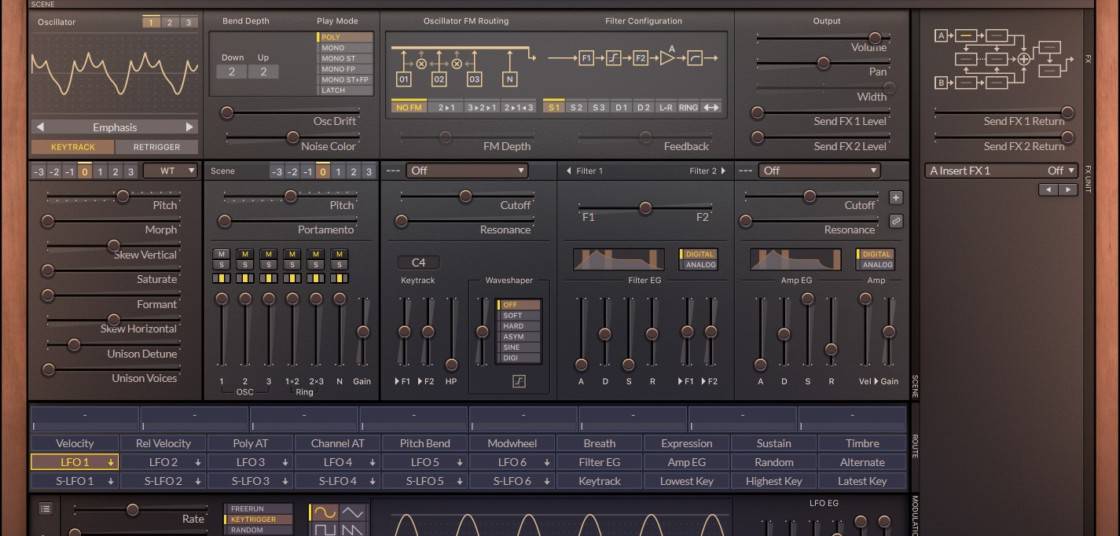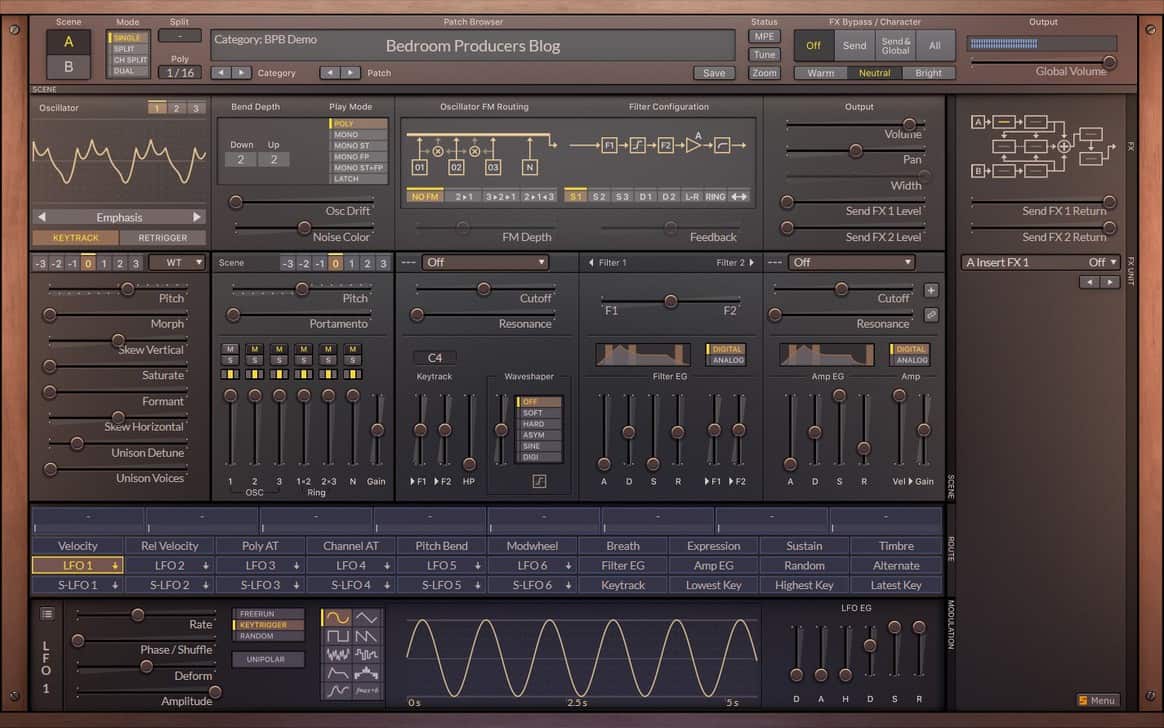Surge Synthesizer Team released the 1.8.0 version of Surge, an open-source virtual synthesizer for digital audio workstations on Windows, macOS, and Linux.
Surge is a digital synthesizer for sound design enthusiasts. It features eight oscillator algorithms (Classic, Sine, Wavetable, Window, FM2, FM3, S&H, and Audio In) with unison. It also offers multiple filter models, a robust modulation workflow, built-in effects, and more.
See also: Best FREE Synthesizer VST PluginsBeing open-source, Surge is an ongoing project that keeps getting better with every update. The latest version (1.8.0) introduces several new features, a new skin, and various minor fixes. Here’s a quick look at what’s new in Surge 1.8.0.
The first notable update is the brand new Royal Surge skin (pictured on the article cover). With its wooden textures and natural accents, the Royal Surge skin boasts a subtle vintage synth visual vibe. More importantly, the new skin uses pastel colors and lower contrast, unlike the old Surge skins.
The previously included Default and Dark skins were also updated with a slight facelift. As before, you can change the GUI size and the skin via the main menu (click the Menu button in the bottom-right corner).
As for the new filters, Surge now comes with two models of vintage ladder filters, one filter model from the OB-Xd virtual synthesizer, the K-35 and diode ladder filters from Odin 2, and a few other modules. The filter type menu is also improved, with new filter categories.
The FX section now integrates 59 Airwindows effects. We mentioned Airwindows in our recent article about free saturation VST plugins. These are some of the best analog-style effects around.
Another major improvement is the inclusion of the multi-segment envelope generator (MSEG) as a modulation source. Surge now implements a fully editable MSEG modulation source, featuring various curve types and editing options
Surge is available in VST3 and AU plugin formats for digital audio workstations on Windows, macOS, and Linux. Both 32-bit and 64-bit plugin hosts are supported.
More info: Surge (95.7 MB download size, EXE installer, 32-bit & 64-bit VST3/AU plugin formats for Windows, macOS, Linux)
More articles:




34 Comments
Jamie M
onThis is a great up date. Surge is a fantastic synth. Thanks for the heads up Tomislav :-)
Tomislav Zlatic
onCheers! Yeah, Surge and Vital are leading the pack nowadays.
Numanoid
onWhat about Odin2, the best freeware synth of 2020 ?
joeHF
onJust… WOW. And now that Renoise supports VST3… should be a good weekend! :)
Tomislav Zlatic
onGood times for music producers!
Igor
onThe inclusion of MSEG in modulation sources is the most interesting new feature for me
Tomislav Zlatic
onGood point, thanks for the reminder. I’ll mention that in the article.
Jamie M.
onDAMN
if they were to make the ui (less sliders more knobs) then it would rival Vital
Tylab
onOh wow, integrating air windows stuff like that slots in a pretty impressive fx/saturation capability into this synth, that seems huge
Tomislav Zlatic
onSuper neat to have the Airwindows effects in a synth. Plenty of potential for harmonic distortion.
Illford
onI don’t see how sliders over knobs can make a synth worse or better than Vital. I mean it doesn’t really affect the sound. And i think Surge in terms of sound is a lot more powerful it’s just a bit harder to fully come to understand.
rek
onthe skins of Surge look great, but the GUI layout is confusing so I don’t use it.
antti maatteri
onNICE gui..
almost looks heckmannesque ;D
Tomislav Zlatic
onYeah, some subtle nuances of DIVA there.
Febbie D.
onH O W
Tomislav Zlatic
onHOF?
Praneet Choudhary
onThe GUI is prettier than my crush!
Airwindows VSTs will finally get some recognition now, they are so, so faya.
I am dropping Vital for Surge, it is not a resource hog and doesn’t look bad at all now.
Tomislav Zlatic
onOh, I couldn’t pick just one. Both Surge and Vital are must-haves in my book. :)
Igor
onImproved filters, and lot of modulation sources brings increased CPU use to Surge, and there are some new presets that brings Surge close to Vital in that matter.
Ege
onGreat update. The new GUI looks cool like expensive paid soft-synths
Corti.Son
onHi,
I bought Surge around 2008 and thought it was pretty good.
Now the synth is open source and it’s getting better and better. I’m sure the Surge Synth Team will continue to put great work into the project.
I like the new UI, new filters, new effects, MSEG…, just great.
rek
onneed to read the manual on how to do routing, it’s not obvious enough. and way to go Chris from AirWindows for being such a good sport to have them tied in with Surge!
rek
onIt’s aesthetically great, especially these new GUIs, but the layout in general takes a lot of getting used to. I’m sure Surge is a great axe if you can swing it, but couldn’t it be factored and smoothed out? there’s sliders going sideways, sliders going vertically, a lot of reading to do (in contrast to say Diva or Valhalla) what I mean is that you’ve got to read words, visually sort out what words belong to what controls, vertically typed words, 90 degree rotated little text labels, a mysterious routing method (not apparent how it works, I’ve done it before but forgot how I did it), esoteric looking signal flow diagrams (do they change like an FS1R maybe? Maybe they’re buttons, I’ll click on them next time I dive in.) basically it’s a very busy layout and the eye needs to dart around searching to connect the dots. The sliders arent very easy to remember since they are many parallel lines. Like the great synth arp odyssey perhaps. not knocking the POWER of this synth, just saying i hope the GUI gets boiled down to something that is fun to tweak. This is not a diss of the project, nor a diss of the original, but GUI ergonomics (or whatever its called) have gone through a lot of evolution since this layout was set up.
EvilDragon
onHello, Rek, one of Surge developers here. Thanks for your comments.
There are some valid concerns you’re mentioning (sideways rotated text – which we removed completely from the Dark skin!). However, the main concept of Surge’s layout is to have everything under your fingertips/mouse cursor, with as little tabbing through sections as possible. I think it achieves this in a pretty good way.
That said, the layout of the synth in places definitely doesn’t reflect the signal flow (highpass filter to the left of waveshaper, when highpass is at the very end of the signal chain? Keytrack controls not next to filter cutoff and resonance? etc.), and this will definitely be addressed in one of future updates.
Mixing up horizontal and vertical sliders is not unheard of, though.
“Mysterious routing method” – do you mean modulation, or signal? Either way, we do have a rather decently written manual that explains everything in a solid amount of detail.
Usually we get comments about how Surge is really fast and fun to use, but not everyone is the same, and that’s good.
In any case, there is going to be a complete layout change in the future (and it will include knobs! But some sliders will remain) that should hopefully make a lot more sense both from signal path and design (margins, spacings, grid positioning…) aspects. Stay tuned!
EvilDragon
onOh and forgot to add: while there will be a layout change, the main concept of Surge will still remain: to have everything important under your fingertips/mouse cursor, with as little tabbing as humanly possible. So it’s not going to be a complete rethink, but a reevaluation of how different sections are laid out and what they contain.
We do have a couple of very good designers and even a UX/HCI expert in our team. It’s gonna be great :)
ambedo
onThis synth has always been a bit confusing to me.. but having all those airwindows effects in the surgeFX plugin is a damn godsend! Seriously – its so nice being able to scroll through different ones and see how they all sound – lots of great effects in there. I think im gonna be using surgeFX a ton in the future.
MRG
onWuvin’ the new fx and filters, MSEGs are sexy. But that Royal GUI is… aaaaah… As much as I want to like it, because it is gorgeous in many ways (it really is), yet my eyes are saying no to the washed out contrast and the weird lighting. Would love a ‘flatter’ version of it, tho. Anywho, no worries, the Dark Skin is a joy to use and I might even have a look at the old Default since it was updated. Thanks to the whole Surge Team for such an amazing update!
MRG
onYes, MRG, I agree with you. But check out the new v1.8.1, it’s even more amazinger!!
Stefan
onBionic Plucks & Mallets (LITE) by Riot Audio Free at Audio Plugin Deals for A Limited Time!
Darryl Lim
onThanks for the tip, love the BPB community! (Especially when Tomislav might be too busy to update :P)
Tomislav Zlatic
onWorking on an article about this one! :)
Darryl Lim
onYay haha! XD
Tomislav Zlatic
onThanks, Stefan!
Manoranjan tarei
onI Want free nx virtual dj software